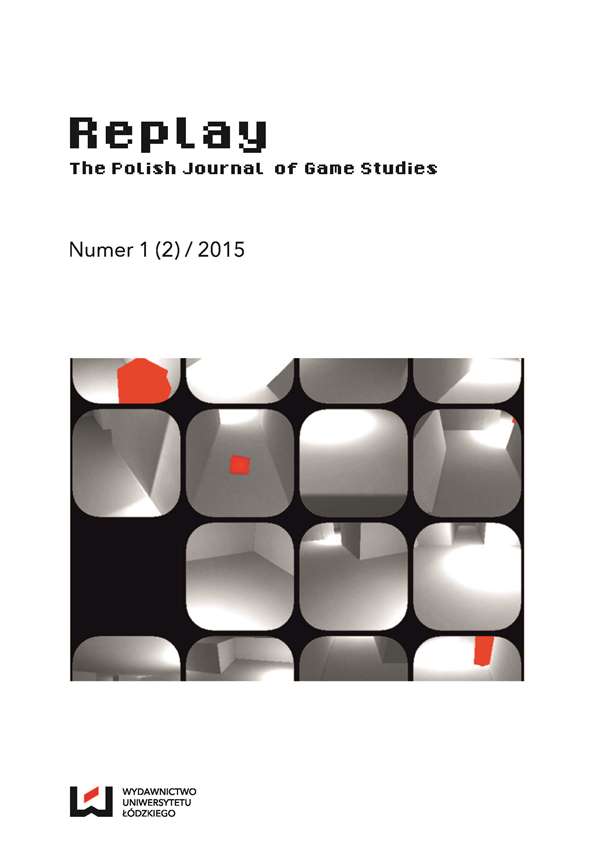Wyjątkowość doświadczenia śmierci w artystycznych grach wideo
DOI:
https://doi.org/10.18778/2391-8551.02.04Słowa kluczowe:
art games, death, video games, Jason Rohrer, Anna Anthropy, Tale of TalesAbstrakt
Video games present different meanings of death than those conditioned by social and cultural contexts. Most games treat the motif of death instrumentally. Therefore, death is usually a norm and a rule in typical video games. However, art games present a different sense of death, one that defies its conventional meanings. The article analyses the different presentations of death in three art games: "Passage" (Rohrer, 2007), "The Graveyard" (Tale of Tales, 2008) and "Queers in Love at the End of the World" (Anthropy, 2013). These productions prove that video games are an excellent medium to offer players a deep emotional experience, which can also encourage taking a fundamental and more profound reflection on the meaning of life and death.
Bibliografia
Aarseth, Espen. 2013, Ontology, [w:] Mark J. P. Wolf, Bernard Perron (red.), The Routledge Companion to Video Game Studies, New York - London: Routledge, s. 484–492.
Google Scholar
Ariès, Philipe. 2011, Człowiek i śmierć, przeł. Eligia Bąkowska, Warszawa: Aletheia.
Google Scholar
Ariès, Philipe. 1993, Śmierć odwrócona, przeł. Jakub M. Godzimirski, w: Stanisław Cichowicz, Jakub M. Godzimirski (red.), Antropologia śmierci. Myśl francuska, Warszawa: PWN, s. 227–283.
Google Scholar
Bauman, Zygmunt. 1995, Ciało i przemoc w obliczu ponowoczesności, Toruń: Uniwersytet Mikołaja Kopernika.
Google Scholar
Czarny, Janusz. 1999, Osoba ludzka w umieraniu i śmierci (ujęcie personalistyczne), w: Bożena Płonka-Syroka (red.), Moralny wymiar choroby, cierpienia i śmierci, Wrocław: Arboretum, s. 25–32.
Google Scholar
Gorer, Geoffrey. 1955, The Pornography of Death, „Encounter”, October, online: <http://www.unz.org/Pub/Encounter-1955oct – 00049> [dostęp: 20.09.2014], s. 49–52.
Google Scholar
Juul, Jesper, 2011, Half-Real. Video Games between Real Rules and Fictional Worlds, Cambridge-London: The MIT Press.
Google Scholar
Kuligowski, Waldemar, Zwierzchowski, Piotr. 2004, Pokażę ci, jak się umiera, w: Waldemar Kuligowski, Piotr Zwierzchowski (red.), Śmierć jako norma, śmierć jako skandal, Bydgoszcz: Akademia Bydgoska, s. 7–11.
Google Scholar
Lenne, Gérard. 2002, Śmierć w kinie, tłum. Tadeusz Szczepański, w: Stanisław Rosiek (red.), Wymiary śmierci, Gdańsk: Słowo/Obraz Terytoria, s. 219–226.
Google Scholar
Majkowski, Tomasz Z. 2011, Gry wideo i kultura autentyczności, „Homo Ludens” nr 1(3), s. 95–102.
Google Scholar
Sterczewski, Piotr. 2016, Ta gra i tak jest głupia, „Dwutygonik”, maj, online: <http://www.dwutygodnik.com/artykul/6556-ta-gra-i-tak-jest-glupia.html> [dostęp: 19.05.2016].
Google Scholar
, Inc., 2002-, Medal of Honor [PC], USA: Electronic Arts.
Google Scholar
Anthropy Anna, 2013, Queers in Love at the End of the World [PC, gra online], USA: Anna Anthropy (grano 20 czerwca 2014).
Google Scholar
Bethesda Softworks, 1994-, The Elder Scrolls [PC], USA: Bethesda Softworks.
Google Scholar
Black Isle Studios, 1999, Planescape: Torment [PC], USA: Interplay Entertainment.
Google Scholar
Blizzard Entertainment, 2012, Diablo III [PC], USA: Blizzard Entertainment.
Google Scholar
Blizzard North, 2000, Diablo II [PC], USA: Blizzard Entertainment.
Google Scholar
Cellar Door Games, 2013, Rogue Legacy [PC], Kanada: Cellar Door Games.
Google Scholar
Maxis, 2000, The Sims [PC], USA: Electronic Arts.
Google Scholar
Epic Games, 1999, Unreal Tournament [PC], USA: GT Interactive.
Google Scholar
id Software, 1999, Quake III: Arena [PC], USA: Activision.
Google Scholar
Konami, 1987, Contra [Nintendo Entertainment System], Japonia: Konami.
Google Scholar
Namco, 1985, Battle City [Nintendo Entertainment System], Japonia: Namco.
Google Scholar
New World Computing, 2002, Might and Magic IX [PC], USA: The 3DO Company.
Google Scholar
Nintendo, 1985, Super Mario Bros. [Nintendo Entertainemnt System], Japonia: Nintendo.
Google Scholar
Rockstar North, 1997-, Grand Theft Auto [PC], USA: Rockstar Games.
Google Scholar
Rohrer Jason, 2007, Passage, [PC], USA: Jason Rohrer.
Google Scholar
Tale of Tales, 2008, The Graveyard [PC], Belgia: Tale of Tales.
Google Scholar
Pobrania
Opublikowane
Jak cytować
Numer
Dział
Licencja

Praca jest udostępniana na licencji Creative Commons Attribution-NonCommercial-NoDerivatives 3.0 Unported License.










